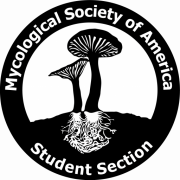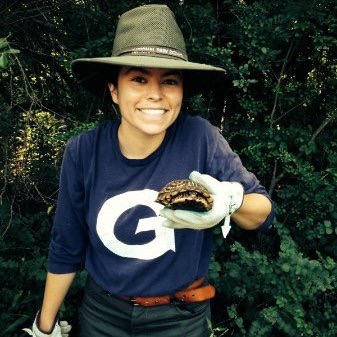
Virginia Poole grew up in a small Southern California beach town, but is local to Oakland, CA. She received her B.S. from UC Davis in Plant Biology. Virgie is currently working toward her Masters in Science at Middle Tennessee State University in the lab of Sarah Bergemann. Virgie is studying bioluminescence in Armillaria mellea. She is identifying and characterizing the genes that encode for bioluminescence by A. tumefaciens, mediated insertional mutagenesis, and conducting a bioluminescence inheritance study to provide data on phenotypic variation of luminescence intensities amongst haploid isolates of A. mellea in an F2 generation. Virgie is currently serving as the Webmaster for the MSA Student Section.
How did you become a mycologist?
I was actually on a deadset path to becoming a botanist, when I was introduced to Sarah Bergemann by a co-worker from Stones River National Battlefield. I’d always been an amateur mushroom hunter and had taken an introductory mycology course at UC Davis with Dr. Rizzo (loved it), but had never really considered a graduate degree in it. Within ten minutes of talking with Sarah, I could tell how exceptionally bright and knowledgeable about fungi she was, and knew that studying with her would be a phenomenal opportunity. We’re still struggling with my writing skills (sorry Sarah), but her passion for fungi and the volume of knowledge she has already imparted to me will stay with me the rest of my life. I’m hooked on fungi.
Who is your mycology role model?
Even before I started my program, I knew of Tom Volk as a major player in the species description game. I almost passed out when I saw him at the annual meeting in Berkeley. He’s so cool.
What is your favorite mushroom, and what do you like about it?
Am I obligated to say Armillaria mellea? Nah. A few months ago, I found a Cortinarius alboviolaceus on a foray in Big South Fork and fell in love with the color and sheen. Such a beautiful mushroom.
What is your favorite fact about fungi?
Fungal reproduction has always fascinated me from mating system types to spore production to zygospores to aeciospores, etc.. Maybe I just have a thing for spores in general?
Do you have any funny or interesting stories about field work or lab work?
I’m not out in the field as much as I would like, but I fruit A. mellea in vitro as part of my project in order to collect basidiospores. I normally autoclave the left over caps, but one day I was feeling a little adventurous. I normally detest the taste of mushrooms but let my curiosity get the best of me. and popped one in my mouth with an initial, “hey, this isn’t too bad.” Turns out A. mellea is best cooked. I had a lingering acrid/metallic taste in my mouth for about the next hour. You think I learned my lesson? Nope. I’ve done it at least three more times.
What do you like to do in your free time? What are your hobbies?
I’m a nature child, so I spend most of my free time hiking, biking, backpacking or adventuring. When I’m not in the lab or outside, I enjoy cooking and crocheting.
Virginia Poole is from Northern California. She received her B.S. from UC Davis in Plant Biology. Virgie is currently working toward her Masters in Science at Middle Tennessee State University in the lab of Sarah Bergemann. Virgie is studying bioluminescence in Armillaria mellea. She is identifying and characterizing the genes that encode for bioluminescence by A. tumefaciens, mediated insertional mutagenesis, and conducting a bioluminescence inheritance study to provide data on phenotypic variation of luminescence intensities amongst haploid isolates of A. mellea in an F2 generation. Virgie is currently serving as the Webmaster for the MSA Student Section.
How did you become a mycologist?
I was actually on a deadset path to becoming a botanist, when I was introduced to Sarah Bergemann by a co-worker from Stones River National Battlefield. I’d always been an amateur mushroom hunter and had taken an introductory mycology course at UC Davis with Dr. Rizzo (loved it), but had never really considered a graduate degree in it. Within ten minutes of talking with Sarah, I could tell how exceptionally bright and knowledgeable about fungi she was, and knew that studying with her would be a phenomenal opportunity. We’re still struggling with my writing skills (sorry Sarah), but her passion for fungi and the volume of knowledge she has already imparted to me will stay with me the rest of my life. I’m hooked on fungi.
Who is your mycology role model?
Even before I started my program, I knew of Tom Volk as a major player in the species description game. I almost passed out when I saw him at the annual meeting in Berkeley. He’s so cool.
What is your favorite mushroom, and what do you like about it?
Am I obligated to say Armillaria mellea? Nah. A few months ago, I found a Cortinarius alboviolaceus on a foray in Big South Fork and fell in love with the color and sheen. Such a beautiful mushroom.
What is your favorite fact about fungi?
Fungal reproduction has always fascinated me from mating system types to spore production to zygospore production to aeciospore production. Maybe I just have a thing for spores in general?
Do you have any funny or interesting stories about field work or lab work?
I’m not out in the field as much as I would like, but I fruit A. mellea in vitro as part of my project in order to collect basidiospores. I normally autoclave the left over caps, but one day I was feeling a little adventurous. I normally detest the taste of mushrooms but let my curiosity get the best of me. and popped one in my mouth with an initial, “hey, this isn’t too bad.” Turns out A. mellea is best cooked. I had a lingering acrid/metallic taste in my mouth for about the next hour. You think I learned my lesson? Nope. I’ve done it at least three more times.
What do you like to do in your free time? What are your hobbies?
I’m a nature child, so I spend most of my free time hiking, biking, backpacking or adventuring. When I’m not in the lab or outside, I enjoy cooking and crocheting.


Leave a Reply